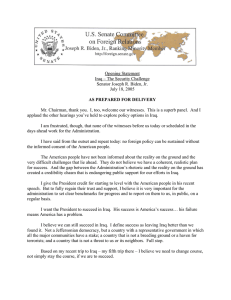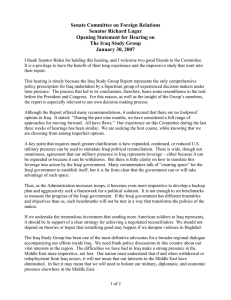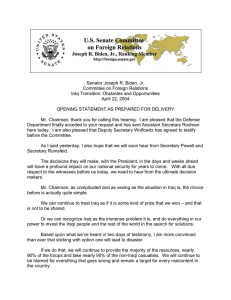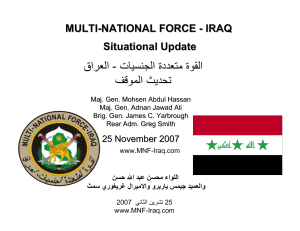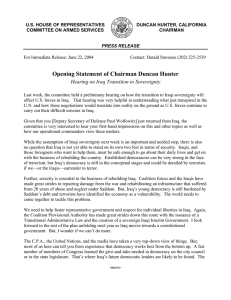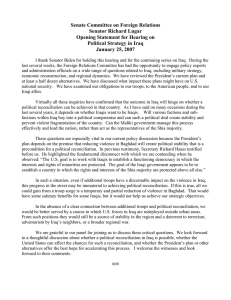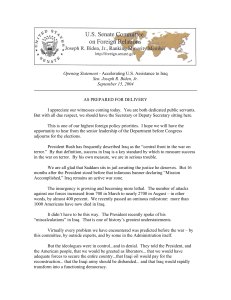Opening Statement – Hearing to Review the UN Oil for... Senator Joseph R. Biden, Jr. April 7, 2004
advertisement
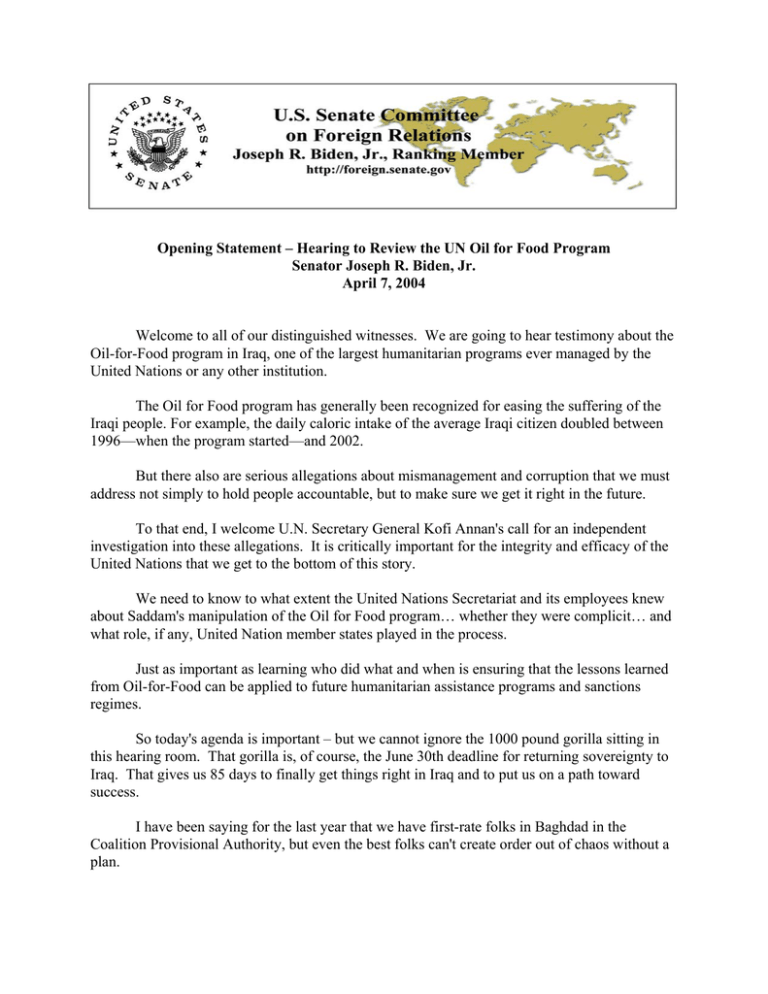
Opening Statement – Hearing to Review the UN Oil for Food Program Senator Joseph R. Biden, Jr. April 7, 2004 Welcome to all of our distinguished witnesses. We are going to hear testimony about the Oil-for-Food program in Iraq, one of the largest humanitarian programs ever managed by the United Nations or any other institution. The Oil for Food program has generally been recognized for easing the suffering of the Iraqi people. For example, the daily caloric intake of the average Iraqi citizen doubled between 1996—when the program started—and 2002. But there also are serious allegations about mismanagement and corruption that we must address not simply to hold people accountable, but to make sure we get it right in the future. To that end, I welcome U.N. Secretary General Kofi Annan's call for an independent investigation into these allegations. It is critically important for the integrity and efficacy of the United Nations that we get to the bottom of this story. We need to know to what extent the United Nations Secretariat and its employees knew about Saddam's manipulation of the Oil for Food program… whether they were complicit… and what role, if any, United Nation member states played in the process. Just as important as learning who did what and when is ensuring that the lessons learned from Oil-for-Food can be applied to future humanitarian assistance programs and sanctions regimes. So today's agenda is important – but we cannot ignore the 1000 pound gorilla sitting in this hearing room. That gorilla is, of course, the June 30th deadline for returning sovereignty to Iraq. That gives us 85 days to finally get things right in Iraq and to put us on a path toward success. I have been saying for the last year that we have first-rate folks in Baghdad in the Coalition Provisional Authority, but even the best folks can't create order out of chaos without a plan. Speaking for myself, I believe we still don't know what the plan is for transferring authority to the Iraqi people. We still do not know how the caretaker Iraqi government will be chosen or what it will look like. We don’t know who will referee the disputes that are sure to come among the Shiia, Sunni and Kurds. We still don’t know what role, if any, the U.N. and NATO will play. We still don’t know who the American ambassador will be in the largest and most important American embassy in the world. In short, we still do not know the answers to the most basic – and critical – questions we face in Iraq. Why are these questions and their answers so important? Because they all go to the fundamental tension we will face on June 30 between two contradictory needs. On the one hand, the Iraqis will desperately need strong international support to provide security, to settle political disputes, and to build the economy. Their own security forces and political leaders will not be ready. On the other hand, the U.S. desperately needs to take the American face off of the occupation of Iraq. Otherwise, we will continue to bear nearly 90% of the cost, take nearly 90% of the non-Iraqi casualties, and provide nearly 90% of the foreign troops. And we will remain responsible for everything that goes wrong in Iraq. How do we square this circle? By seizing one last chance to get the U.N. and NATO in on the deal. A U.N. High Commissioner would have more legitimacy with Iraqis than a U.S. ambassador to help them decide on a caretaker government, to referee disputes and to oversee elections. And the U.N. would open the door to more international participation by giving political cover to leaders whose people opposed the war. NATO cannot take on Iraq tomorrow. But it could quickly generate enough troops to patrol Iraq’s borders, train its military and take responsibility for the North or the Polish sector. And that would free up our forces for General Abizaid to use where they are most needed and change the complexion of the occupation. We may be a day late and a dollar short in getting the U.N. and NATO engaged. This Administration squandered many opportunities to do so. And the worse the situation on the ground becomes, the more reluctant others will be to get involved. But I still believe we have a chance to broaden the coalition, because many of our friends and allies have as much at stake in Iraq’s success – and as much to fear from its failure – as we do. We must make one last effort to get them on board. In short, I believe that we still can succeed and ensure a positive outcome on June 30th. But to do so the Administration needs to get serious NOW about answering these fundamental questions. And that’s why I will raise them today, tomorrow and every other chance I get until we get some answers. Let me conclude by saying that President Bush should be on a plane or on the phone with our major allies to ask for their help and to tell them we have to work together – it’s up to him to lead.


